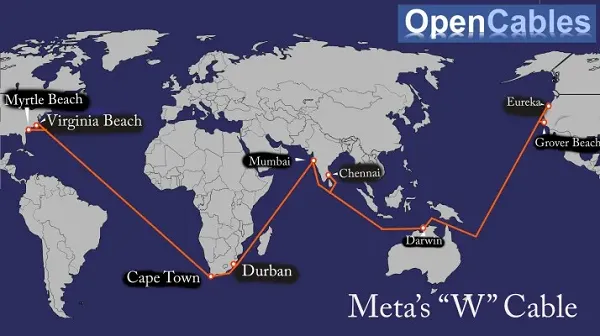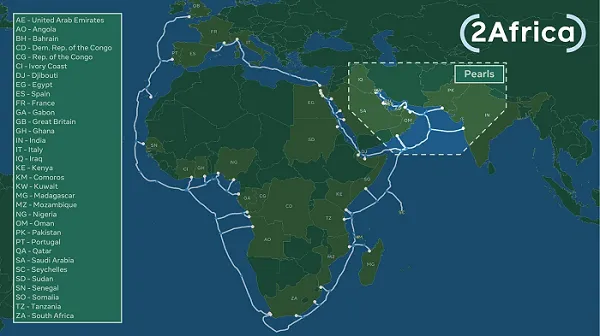It’s attention-grabbing to contemplate our reliance on subsea cables to energy world connectivity, and the susceptibility of such to sabotage, in numerous methods, which might jeopardize complete industries.
That’s what got here to thoughts upon listening to of Meta’s newest subsea cable undertaking, which is able to see the corporate make investments greater than $10 billion into a brand new initiative that can lay greater than 40,000 kilometers of subsea cabling, with the intention to develop connection capability in additional areas.
As reported by TechCrunch:
“The deliberate route of the cable, says sources, presently sees it spanning from the east coast of the U.S. to India by way of South Africa, after which to the west coast of the U.S. from India by way of Australia – making a “W” form across the globe.”

As you’ll be able to see on this diagram, the “W” cable undertaking would give Meta connectivity to virtually each continent, and would construct upon Meta’s previous “2Africa” cabling undertaking which centered on Africa particularly.

The 2 initiatives would successfully give Meta possession of a worldwide community of knowledge, although the “W” undertaking is predicted to be the primary time that Meta will search to go it alone on a significant subsea undertaking.
On the 2Africa undertaking, Meta partnered with numerous regional suppliers to facilitate broader connection, open to a variety of providers. The proposal for this new cable is extra particular person, with Meta taking management of its personal community, which might primarily energy expanded connectivity in India, for a broader push on AI and VR within the area.
That would ultimately imply that Meta has extra management over how its cable is used, and extra leverage over these areas extra broadly. In essence, that might additionally imply that Meta has extra sway over the more and more helpful Indian market, and it’ll be attention-grabbing to see how Indian authorities react to the plan, and what they require of Meta to approve such.
And as famous, there may be additionally the query of susceptibility of subsea cables, to pure phenomena for one (sharks apparently like to chew on subsea cabling), but in addition to state-sanctioned sabotage and assault.
Final week, reviews emerged {that a} Chinese language industrial ship had not too long ago been accused of intentionally dragging its anchor to chop undersea cables, on the behest, allegedly, of Russian operatives.
As reported by The Wall Road Journal:
“Worldwide investigators reportedly consider the crew aboard Yi Peng 3, a bulk provider stuffed with Russian fertilizer, dragged its anchor for greater than 100 miles throughout the Baltic seabed, damaging the cables that run throughout it. Two totally different web hyperlinks – one between Sweden’s Gotland Island and Lithuania, and one other between Finland and Germany – stopped working earlier this month, prompting the investigation by authorities from all 4 nations and different nations.”
It’s regarding that complete nations could be successfully minimize off by such actions, however then once more, there’s probably not any various to energy expanded connection throughout borders.
Perhaps, in future, satellite tv for pc connectivity will supersede bodily cables, however we’re not there but. And perhaps, on condition that Starlink is without doubt one of the leaders on that entrance, there’ll be a degree of hesitancy there as properly, on condition that it’s managed by a politically divisive billionaire, who could or could not use such for his personal profit.
It’s an attention-grabbing consideration within the broader scheme of issues, because the web turns into a extra vital ingredient in trendy life.
And as such, it’s suppliers, and homeowners of such, that can maintain sway, which can be what Meta’s going for on this occasion.






